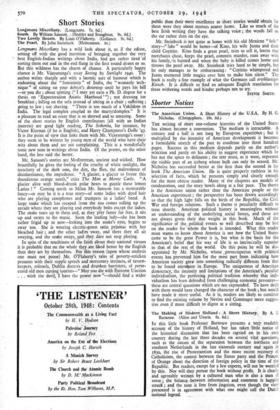Shorter Notices
The American Union. A Short History of the U.S.A. By H. G. Nicholas. (Christophers. Ws. (d.) Tim writing of short one-volume histories of the United States has almost become a convention. The medium is intractable. A century and a half is not long by European experience but if multiplied by the intensity of American development it becomes a formidable stretch of the past to condense into three hundred pages. Success in this medium depends partly on the author's selection and partly on his ability to suggest experience which he has dot the space to delineate ; the text must, as it were, represent the visible part of an iceberg whose bulk can only be sensed. Mr. Nicholas has succeeded better at the first than the second in his book The American Union. He is quite properly ruthless in his selection of facts, which he presents simply and clearly enough for the most obtuse .reader. Many of the chapters are models of condensation, and the story bowls along at a fair pace- The theme is the American union rather than the American people of the American experiment ; th& perspective has been drawn accordingly so that the high light falls on the birth of the Republic, the Civil War and foreign relations. Such a theme is peculiarly difficult to treat shortly. American political history is meaningless without an understanding of the underlying social forces, and these are not always given their due weight in this book. Much of the significance of the political 'events so well described may be lost on the reader for whom the book is intended. What this reader most wants. to know about America is not how the United States came to be the great Power it is, but what is the basis for the American's belief that his way of life is so intrinsically superior to that of the rest of the world. On this point he will be dis- appointed by Mi. Nicholas, whose .preoccupation with .‘political events has, prevented him for the most part from iriaiditing how American -society grew into something radically different from that to be found anyWdziere in .Europe. The uniqueness of American democracy;'rhe intensity and limitations of the American's peculiar individualism, the persisting. political tradition whereby 'dig indi- vidualism has been defended from challenging economic pressures— these are central questions viThich are not expounded. To have dealt with them would have changed the character of the book ; but would have made it more useful. As it is, readers are likely- to continue to find the existing volume by Nevins and Commager more sugges- tive .even if more difficult to digest at a sitting.


































 Previous page
Previous page